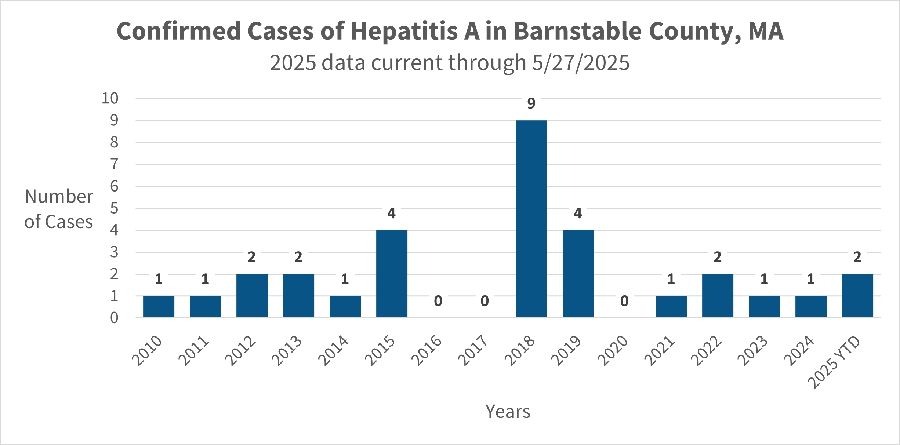This article was updated on May 29, 2025.
PROVINCETOWN — On the Saturday of Memorial Day weekend, the traditional kickoff of summer on Cape Cod, an alert went out from the Dept. of Public Health to news media across the state: a food-service worker at the Red Inn in Provincetown had contracted the hepatitis A virus, and people who dined at the restaurant between April 30 and May 15 could have been exposed.

“Hepatitis A is spread as a result of fecal contamination (fecal-oral route) and may be spread from person to person through close contact or through food handling,” the alert said. “The virus can be spread by contaminated food and beverages.”
This type of “patron alert” is designed to reach people at risk as quickly as possible, said Barnstable County epidemiologist Lea Hamner.
“The patron notification is an important tool for public health when we can’t identify all the folks who were exposed with whom we need to communicate,” she said. Time was a factor, Hamner said, because people who could have been exposed could protect themselves by getting the hepatitis A vaccine or beginning a course of immune globulin medication if they acted within two weeks of their potential exposure.
“When we got the information the person was a food handler and figured out their infectious period, we were pretty close to the end of the period where a post-exposure prophylaxis vaccine could do some good,” Hamner said. “We needed to give people as many days as possible to talk to their doctor and find a vaccine if they needed a vaccine.”
The alert worked: the news of hepatitis A in Provincetown was picked up by NBC, CBS, and ABC stations in Boston and their affiliates around the country. CBS Boston put the word “outbreak” in its headline, while headline writers at the Daily Mail in London swung for the fences: “Hepatitis A outbreak strikes elite enclave known as playground for the rich.”
At the same time, Provincetown’s health dept. put out its own press release with more information about the likely origin of the infection.
“From my experience inspecting the Red Inn through the years, this is not a facilities issue,” Health Director Lezli Rowell stated. “The staff is knowledgeable, trained in food safety and committed to best management practices, and the back of the house is top-notch.
“This is just an unfortunate illness that happened to an individual who is reported to be recovering well and remaining out of work until medically cleared to resume food handling employment,” Rowell stated.
Provincetown Board of Health chair Dr. Susan Troyan weighed in as well. “As hepatitis A can be infectious for weeks prior to any symptoms, an event such as this can happen to any restaurant regardless of strict adherence to health standards,” Troyan said. “I thank the management and employees of the Red Inn for their assistance in this public health process.”
“We haven’t found any other cases related to that restaurant,” Hamner told the Independent on May 27. “We’re vigilant and waiting to see what happens, but the indication so far is that the restaurant is not the source.”
What Happened?
The epidemiology of hepatitis A helps explain what probably happened, Hamner said.

“We usually have one or two cases of hepatitis A on Cape Cod per year — sometimes none,” she said. “A lot of hepatitis A is travel-associated. There is hepatitis A transmitting in other countries more readily, but in the United States we do not see a lot of hepatitis A transmission.”
Vaccination has helped knock down the amount of hepatitis A transmission in the U.S., Hamner said, adding that “it’s a wonderful vaccine, a very effective long-term vaccine.”
Although it is rare, hepatitis A can be difficult to control because people can spread the virus for up to two weeks before showing any symptoms themselves.
“In the food service industry, it’s really important that food handlers don’t work with symptoms, but hepatitis A is a bit of a bear because you can be infectious to others for up to two weeks before you show symptoms,” Hamner said.
No other cases on Cape Cod are thought to be connected to this particular patient, Hamner said. “There’s been one other case on Cape Cod this year to date, and it doesn’t appear to be related,” she said.
Dr. Troyan told the Independent that “there’s no evidence that it arose from the restaurant itself. If that were true, we’d be talking about all these people that have been to Provincetown or been to the Red Inn coming down with hepatitis, but there’s no evidence of that.”
That’s why the restaurant is still open, Troyan said. “It’s just a restaurant whose employee came down with hepatitis A — who could have gotten that anywhere, from something they ingested or close contact with someone who had it — and then took all the appropriate measures to make sure that everyone was safe.”
All food-service workers at the Red Inn were told by public health officials that they needed to either get the hepatitis A vaccine if they were not already vaccinated, take a course of the protective immune globulin medication, or stay home for 28 days, Troyan said.
Initially, hepatitis A vaccines were being reserved for restaurant staff and other close contacts, Troyan said, but there is now a supply of the vaccine available at Outer Cape Health Services and other local pharmacies. The county is working on holding a vaccine clinic on the Outer Cape, Hamner said, including for workers at other restaurants.
Philip Mossy, an owner of the Red Inn, told the Independent that most people working there already had the hepatitis A vaccine, and another five or six chose to get the vaccine and continue working. “Nobody wanted to stay home,” Mossy said.
A Lot of Press
Mossy said that friends in New York City and California had seen news reports about hepatitis at the Red Inn.
“All my friends are sending me text messages: ‘I saw the news. I’m sorry you’re going through this,’ ” Mossy said. “They’re educated people, and they know what this is, but the news alerts never explained that the person didn’t contract it through the restaurant itself.
“What’s frustrating is that when people search the internet for the Red Inn, what’s going to come up years from now is ‘hepatitis scare,’ ” Mossy said. “We’ll be fine — we’ve been here long enough that we can weather something like this — but what if this had happened to one of the other restaurants in town that just opened? I don’t think they could come back from that.”
Troyan said the town and its restaurant owners are committed to public health.
“Our inspectors will find tiny things, and while they’re still there owners are calling mechanics to get them fixed,” Troyan said. “People are committed to following the rules, and they understand they exist for a reason.
“I think Provincetown is one of the safest places to eat,” Troyan said. “These restaurants try to do everything right, and this sort of thing will just happen.”
Update: On May 28, after this article went to press, Provincetown Health Director Lezli Rowell wrote to the Independent: “No one is operating under the belief that the illness was caused at or by the place of employment, nor do health officials have any sense that contaminated food was actually served. These alerts do our best to reach unknown persons who may have dined in early May, while a patient could have been contagious but not yet presenting symptoms, so they can assess with their healthcare provider whether they already have been vaccinated or need PEP. As of this writing, there are no additional cases identified.”
